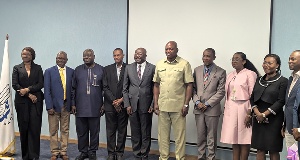Business News of Thursday, 8 May 2025
Source: www.ghanawebbers.com
Gov’t revives national carrier agenda with task force inauguration
A national airline is essential for any country aiming to connect with a continent. This is not just about pride; it drives economic growth and connectivity, said Mr. Nikpe.
This initiative comes two decades after Ghana Airways collapsed. There have been several failed attempts to relaunch a national carrier. The current effort is the most organized yet, featuring a dedicated task force.
Charles Asare, a former aviation executive, chairs the task force. Twumasi-A. Selby serves as Vice Chairman. Other members include Yvonne Opare, Joyce Bawa Mogtari, and others.
The task force's job is to finalize the business model and operational framework. They will engage with strategic partners and ensure regulatory compliance. They will also help with staffing and acquiring aircraft.
The Transport Minister highlighted that Ghana’s aviation infrastructure has improved significantly over the past decade but remains underused. He noted that without a national airline, foreign carriers benefit from Ghana's investments.
Mr. Asare promised that the airline would be commercially sound and sustainable. He emphasized that this is a national assignment aimed at serving Ghanaians' long-term interests.
Despite optimism, some are concerned about the economic viability of national carriers in emerging markets. Analysts point out that many African countries struggle to sustain state-backed airlines due to high costs and competition from international carriers.
Observers say national airlines can be politically appealing but often face commercial challenges. For Ghana, adopting a hybrid public-private model may be crucial for success.
The government seems aware of these risks. The sector minister stated that the airline won't be purely state-owned. They are seeking strategic partnerships for capital and expertise.
This initiative has strong political support from President John Dramani Mahama. He has consistently advocated for reviving a national airline as part of his economic agenda.
The Transport Ministry announced that the task force will report periodically to the president's office. They aim to deliver a comprehensive roadmap for launching the airline soon.
Ghana was one of West Africa's first countries to operate a national airline with Ghana Airways from 1958 until 2004 when it ceased operations due to inefficiencies.
Its successor, Ghana International Airlines, faced similar issues during its five years from 2005 to 2010.
Since then, private operators have tried to fill the gap but haven't matched the scale or brand value of the former state carrier.
Countries like Ethiopia and Rwanda show that successful national airlines can exist in Africa if managed well and positioned effectively in regional transit traffic.











